lesson1-研究生英语阅读教程(提高级_第三版)原文及翻译(可打印修改)
研究生英语阅读教程(提高级)课后习题翻译(带原文、最全版)
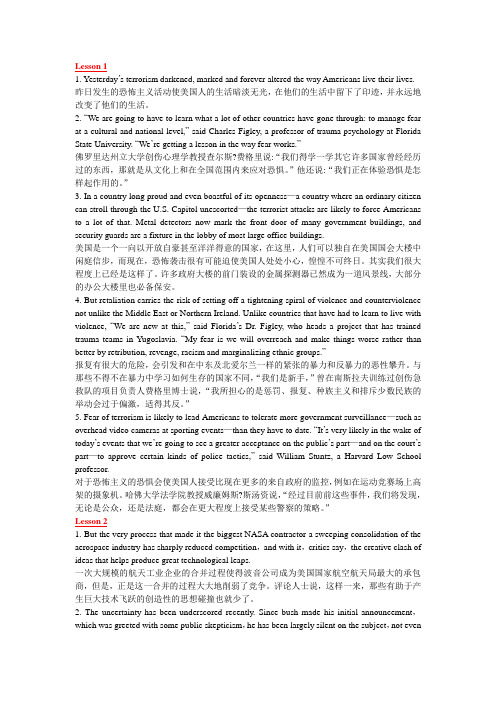
Lesson 11. Yesterday’s terrorism darkened, marked and forever altered the way Americans live their lives. 昨日发生的恐怖主义活动使美国人的生活暗淡无光,在他们的生活中留下了印迹,并永远地改变了他们的生活。
2. “We are going to have to learn what a lot of other countries have gone through: to manage fear at a cultural and national level,” said Charles Figley, a professor of trauma psychology at Florida State University. “We’re getting a lesson in the way fear works.”佛罗里达州立大学创伤心理学教授查尔斯?费格里说:“我们得学一学其它许多国家曾经经历过的东西,那就是从文化上和在全国范围内来应对恐惧。
”他还说:“我们正在体验恐惧是怎样起作用的。
”3. In a country long proud and even boastful of its openness—a country where an ordinary citizen can stroll through the U.S. Capitol unescorted—the terrorist attacks are likely to force Americans to a lot of that. Metal detectors now mark the front door of many government buildings, and security guards are a fixture in the lobby of most large office buildings.美国是一个一向以开放自豪甚至洋洋得意的国家,在这里,人们可以独自在美国国会大楼中闲庭信步,而现在,恐怖袭击很有可能迫使美国人处处小心,惶惶不可终日。
研究生英语精读教程(第三版_上)第1单元英文原文与翻译和课后答案(20201219234917)

Unit OneYou Are What You ThinkAnd if you change your mind—from pessimism to optimism—you can change your life 你认为自己是什么样的人,那你就是什么样的人如果你改变想法——从悲观变为乐观——你就可以改变自己的生活Claipe Safran 卡勒普·撒弗兰[ 1 ] Do you see the glass as half full rather than half empty? Do you keep your eyeupon the doughnut, not upon the hole? Suddenly these clichés are scientific questions, as researchers scrutinize the power of positive thinking.[1] 你看酒杯是半杯有酒而不是半杯空着的吗?你的眼睛是盯着炸面圈,而不是它中间的孔吗? 当研究者们仔细观察积极思维的作用时,这些陈词滥调突然间都成了科学问题。
[ 2] A fast-growing body of research—104 studies so far, involving some 15 000people—is proving that optimism can help you to be happier, healthier and moresuccessful. Pessimism leads, by contrast, to hopelessness, sickness and failure, andis linked to depression, loneliness and painful shyness. "If we could teach people tothink more positively," says psychologist Craig A. Anderson of Rice University inHouston,"it would be like inoculating them against these mental ills."[2]迅速增多的大量研究工作——迄今已有 104 个研究项目,涉及大约 15 000人——证明乐观的态度可以使你更快乐、更健康、更成功。
研究生英语阅读教程第三版lesson1翻译

1.英语是个杀手。
正是英语造成了康瑞克,康尼施,诺恩和曼科斯语的消亡。
这些岛上仍然有相当多的群体使用英语到来之前就已经存在的语言。
然而英语在日常生活中无处不在,所有人或者说几乎所有人都懂英语,英语对现存的三种凯尔特语——爱尔兰语,苏格兰盖尔语和威尔士语的威胁如此之大,以至于它们的未来岌岌可危。
2.同时,他认为这样的政策带有蔑视色彩,他称之为语言歧视(和种族歧视和
性别歧视类似)。
在菲利普森看来,在占主导的白人英语的世界里,处于领导地位的机构和个人(有意或无意的)鼓励或至少是容忍——当然没有反对——英语霸权主义的传播。
它开始于三世纪前,为了经济和殖民的扩张。
3.总的来说,我们现在或多或少认为它们是有利的,而且经常以崇敬和赞赏的
心态去谈论与它们相关的文化和它们为世界所做的贡献。
这么做也没有什么风险,因为这些语言现在已不构成什么威胁。
4.然而许多人把英语看做一种福。
在此,我暂且不谈世界上任何一种语言都具
有的明显的优势,例如广泛的交流网络,强大的文化传媒体系,以及强有力地文化教育机构。
5.讲英语的英国血统的南非人并不强烈反对种族隔离政权,并且由多种语言成
员构成的黑人反对力量,起初很脆弱,同时也缺乏组织。
6.这一象征表明世界通用语的使用者应充分发掘这个福给我们带来的好处,同
时也要尽可能的去避免招致灾祸。
研究生英语阅读教程基础版第三版课后翻译Lesson1-4
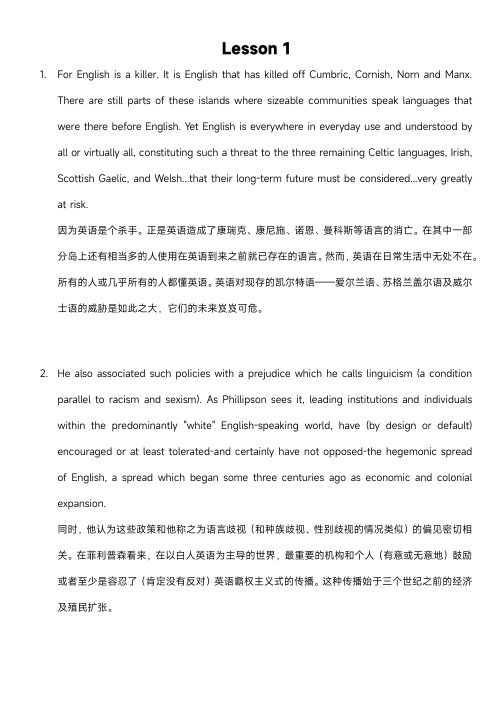
Lesson 11.For English is a killer. It is English that has killed off Cumbric, Cornish, Norn and Manx.There are still parts of these islands where sizeable communities speak languages that were there before English. Y et English is everywhere in everyday use and understood by all or virtually all, constituting such a threat to the three remaining Celtic languages, Irish, Scottish Gaelic, and Welsh...that their long-term future must be considered...very greatly at risk.因为英语是个杀手。
正是英语造成了康瑞克、康尼施、诺恩、曼科斯等语言的消亡。
在其中一部分岛上还有相当多的人使用在英语到来之前就已存在的语言。
然而,英语在日常生活中无处不在。
所有的人或几乎所有的人都懂英语。
英语对现存的凯尔特语——爱尔兰语、苏格兰盖尔语及威尔士语的威胁是如此之大,它们的未来岌岌可危。
2.He also associated such policies with a prejudice which he calls linguicism (a conditionparallel to racism and sexism). As Phillipson sees it, leading institutions and individuals within the predominantly "white" English-speaking world, have (by design or default) encouraged or at least tolerated-and certainly have not opposed-the hegemonic spread of English, a spread which began some three centuries ago as economic and colonial expansion.同时,他认为这些政策和他称之为语言歧视(和种族歧视、性别歧视的情况类似)的偏见密切相关。
《研究生英语阅读教程》(基础级)第三版课文译文
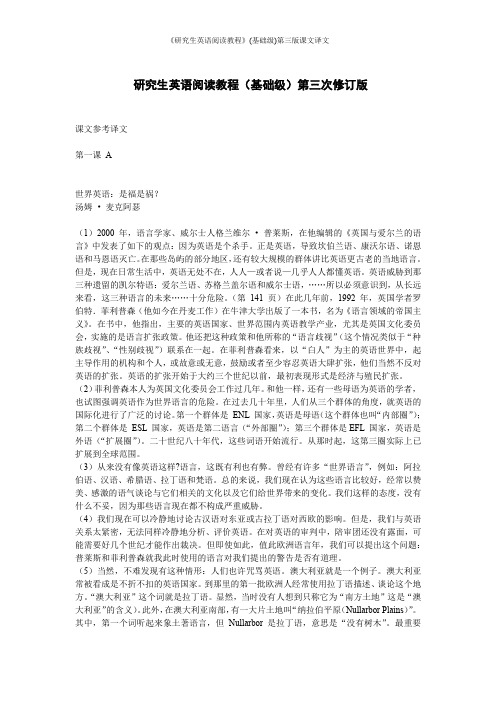
研究生英语阅读教程(基础级)第三次修订版课文参考译文第一课A世界英语:是福是祸?汤姆•麦克阿瑟(1)2000 年,语言学家、威尔士人格兰维尔•普莱斯,在他编辑的《英国与爱尔兰的语言》中发表了如下的观点:因为英语是个杀手。
正是英语,导致坎伯兰语、康沃尔语、诺恩语和马恩语灭亡。
在那些岛屿的部分地区,还有较大规模的群体讲比英语更古老的当地语言。
但是,现在日常生活中,英语无处不在,人人—或者说—几乎人人都懂英语。
英语威胁到那三种遗留的凯尔特语:爱尔兰语、苏格兰盖尔语和威尔士语,……所以必须意识到,从长远来看,这三种语言的未来……十分危险。
(第141 页)在此几年前,1992 年,英国学者罗伯特.菲利普森(他如今在丹麦工作)在牛津大学出版了一本书,名为《语言领域的帝国主义》。
在书中,他指出,主要的英语国家、世界范围内英语教学产业,尤其是英国文化委员会,实施的是语言扩张政策。
他还把这种政策和他所称的“语言歧视”(这个情况类似于“种族歧视”、“性别歧视”)联系在一起。
在菲利普森看来,以“白人”为主的英语世界中,起主导作用的机构和个人,鼓励或者至少容忍英语大肆扩张,他们当然不反对英语的扩张。
英语的扩张开始于大约三个世纪以前,最初表现形式是经济与殖民扩张。
(2)菲利普森本人为英国文化委员会工作过几年。
和他一样,还有一些母语为英语的学者,也试图强调英语作为世界语言的危险。
在过去几十年里,人们从三个群体的角度,就英语的国际化进行了广泛的讨论。
第一个群体是ENL 国家,英语是母语(这个群体也叫“内部圈”);第二个群体是ESL 国家,英语是第二语言(“外部圈”);第三个群体是EFL 国家,英语是外语(“扩展圈”)。
二十世纪八十年代,这些词语开始流行。
从那时起,这第三圈实际上已扩展到全球范围。
(3)从来没有像英语这样?语言,这既有利也有弊。
曾经有许多“世界语言”,例如:阿拉伯语、汉语、希腊语、拉丁语和梵语。
总的来说,我们现在认为这些语言比较好,经常以赞美、感激的语气谈论与它们相关的文化以及它们给世界带来的变化。
研究生英语阅读教程 提高级 部分翻译

Lesson 11.昨日发生的恐怖主义活动使美国人的生活暗淡无光,在他们的生活中留下了印迹,并永远地改变了他们的生活。
2.佛罗里达州立大学创伤心理学教授查尔斯·费格里说:“我们得学一学其它许多国家曾经经历过的东西,那就是从文化上和在全国范围内来应对恐惧。
”他还说:“我们正在体验恐惧是怎样起作用的。
”3.美国是一个一向以开放自豪甚至洋洋得意的国家,在这里,人们可以独自在美国国会大楼里闲庭信步,而现在,恐怖袭击很有可能迫使美国人处处小心,惶惶不可终日。
其实我们很大程度上已经是这样了。
许多政府大楼的前门装设的金属探测器已然成为一道风景线,大部分的办公大楼里也必备保安。
4.报复有很大的危险,会引发和在中东及北爱尔兰一样的紧张的暴力和反暴力的恶性攀升。
与那些不得不在暴力中学习如何生存的国家不同,“我们是新手”曾在南斯拉夫训练过创伤急救队的项目负责人费格里博士说:“我所担心的是惩罚,报复,种族主义和排斥少数民族的举动会过于偏激,适得其反。
”5.对于恐怖主义的恐惧会使美国人接受比现在更多的来自政府的监控,例如在运动竞赛场上高架的摄象机。
哈佛大学法学院教授威廉姆斯·斯汤资说:“经过目前这些事件,我们将发现,无论是公众’还是法庭,都会在更大程度上接受某些警察的策略。
”Lesson 51.戴维先到一步,事后他气愤地向我发难说当他告诉领班准备和谁一起吃饭时,领班的语气骤然逆转。
一瞬间就从“这是个什么人?”变成“这边有请,先生。
”当我们赶到时,拍照的人已经在饭店外忙个不停了。
戴维开始嘲笑我是伦敦这家高级饭店里的知名人物。
这时,我俩向屋内望去并同时看到了我们的偶像。
2.我的生活中——与维多利亚一起的生活中——一件美好的事情就是有时那些让我在见面之前紧张不安,在见面时张口结舌的人,最终却成为我的朋友。
3.他们非常慷慨:我在意大利见到埃尔顿的那个下午,几乎他所做的第一件事就是把他们在法国南部的住处提供给维多利亚和我以便我们一旦需要远离烦乱的生活时有个落脚的地方。
(完整版)研究生英语阅读教程第三版课文Lesson1
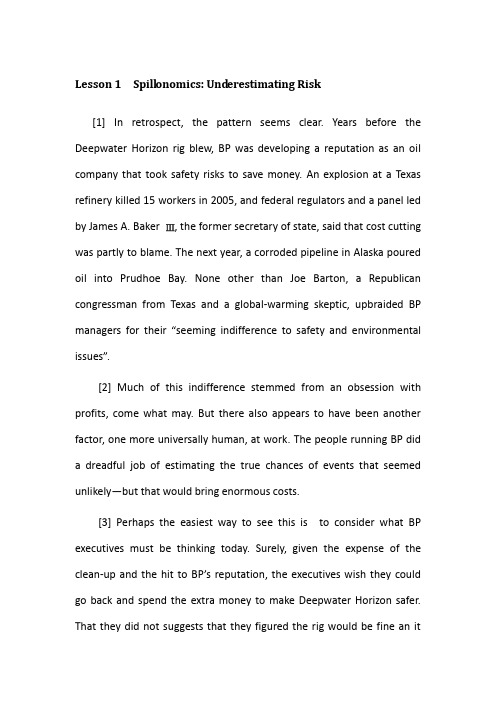
Lesson 1 Spillonomics: Underestimating Risk[1] In retrospect, the pattern seems clear. Years before the Deepwater Horizon rig blew, BP was developing a reputation as an oil company that took safety risks to save money. An explosion at a Texas refinery killed 15 workers in 2005, and federal regulators and a panel led by James A. BakerⅢ, the former secretary of state, said that cost cutting was partly to blame. The next year, a corroded pipeline in Alaska poured oil into Prudhoe Bay. None other than Joe Barton, a Republican congressman from Texas and a global-warming skeptic, upbraided BP managers for their “seeming indifference to safety and environmental issues”.[2] Much of this indifference stemmed from an obsession with profits, come what may. But there also appears to have been another factor, one more universally human, at work. The people running BP did a dreadful job of estimating the true chances of events that seemed unlikely—but that would bring enormous costs.[3] Perhaps the easiest way to see this is to consider what BP executives must be thinking today. Surely, given the expense of the clean-up and the hit to BP’s reputation, the executives wish they could go back and spend the extra money to make Deepwater Horizon safer. That they did not suggests that they figured the rig would be fine an itwas.[4]For all the criticism BP executives may deserve, they are far from the only people to struggle with such low-probability, high-cost events. Nearly everyone does. “These are precisely the kinds of events that are hard for us as humans to get our hands around and react to rationally, ”Robert N. Stavins, an environmental economist at Harvard, says. We make two basic—and opposite—types of mistakes. When an event is difficult to imagine, we tend to underestimate its likelihood. This is the proverbial black swan. Most of the people running Deepwater Horizon probably never had a rig explode on them. So they assumed it would not happen , at least not to them.[5] Similarly, Ben Bernanke and Alan Greenspan liked to argue, not so long ago, that the national real estate market was not in a bubble because it had never been in one before. Wall Street traders took the same view and built mathematical models that did not allow for the possibility that house prices would decline. And may home buyers signed up for unaffordable mortgages, believing they could refinance or sell the house once its price rose. That’s what house prices did, it seemed.[6]On the other hand, when an unlikely event is all too easy to imagine, we often go in the opposite direction and overestimate the odds. After the 9/11 attacks, Americans canceled plane trips and took to the road. There were no terrorist attacks in this country in 2002, yet theadditional driving apparently led to an increase in traffic fatalities.[7]When the stakes are high enough, it falls to government to help its citizens avoid these entirely human errors. The market, left to its own devices, often cannot do so. Yet in the case of Deepwater Horizon, government policy actually went the other way. It encouraged BP to underestimate the odds of a catastrophe.[8] In a little-noticed provision in a 1990 law passed after the Exxon Valdez spill, Congress capped a spiller’s liability over and above cleanup costs at $7500 million for a rig spill. Even if the party is on the hook for only $7500 million. (In this instance, BP has agreed to waive the cap for claims it deems legitimate. ) Michael Greenstone, an M.I.T. economist who runs the Hamilton Project in Washington, says the law fundamentally distorts a company’s decision making. Without the cap, executives would have to weigh the possible revenue from a well against the cost of drilling there and the risk of damage. With the cap, they can largely ignore the potential damage beyond cleanup costs. So they end up drilling wells even in places where the damage can be horrific, like close to a shoreline. To put it another way, human frailty helped BP’s executives underestimate the chance of a low-probability, high-cost event. Federal law helped them underestimate the costs.[9] In the wake of Deepwater Horizon, Congress and Obama administration will no doubt be tempted to pass laws meant to reducethe risks of another deep-water disaster. Certainly there are some sensible steps they can take, like lifting the liability cap and freeing regulators from the sway of industry. But it would be foolish to think that the only risks we are still underestimating are the ones that have suddenly become salient.[10]The big financial risk is no longer a housing bubble. Instead, it may be the huge deficits that the growth of Medicare, Medicaid and Social Security will cause in coming years—and the possibility that lender will eventually become nervous about extending credit to Washington. True, some economists and policy makers insist the country should not get worked up about this possibility, because lenders have never soured on the Unite States government before and show no signs of doing so now. but isn’t that reminiscent of the old Bernanke-Greenspan tune about the housing market?[11]Then, of course, there are the greenhouse gases that oil wells ( among other things) send into the atmosphere even when the wells function properly. Scientists say the buildup of these gases is already likely to warm the planet by at least three degrees over the next century and cause droughts, storms and more ice-cap melting. The researcher’s estimates have risen recently, too, and it is also possible the planet could get around 12 degree hotter. That kind of could flood major cities and cause parts of Antarctica to collapse.[12]Nothing like that has ever happened before. Even imagining it is difficult. It is much easier to hope that the odds of such an outcome are vanishingly small. In fact, it’s only natural to have this hope. But that doesn’t make it wise.。
研究生英语精读教程第三版上unit-one原文
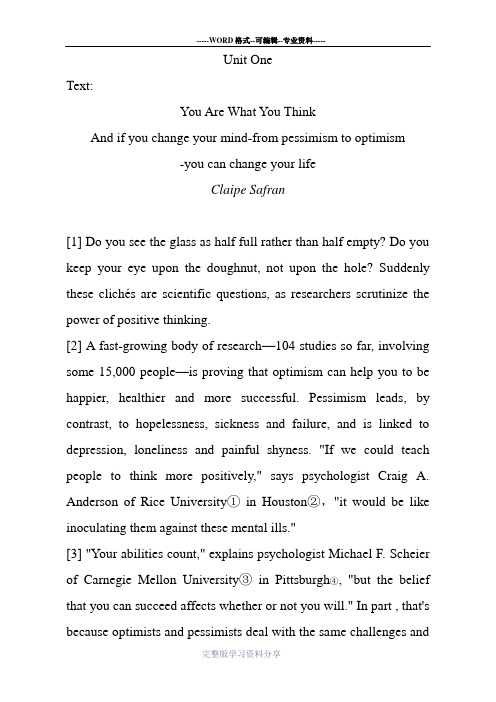
Unit OneText:You Are What You ThinkAnd if you change your mind-from pessimism to optimism-you can change your lifeClaipe Safran[1] Do you see the glass as half full rather than half empty? Do you keep your eye upon the doughnut, not upon the hole? Suddenly these clichés are scientific questions, as researchers scrutinize the power of positive thinking.[2] A fast-growing body of research—104 studies so far, involving some 15,000 people—is proving that optimism can help you to be happier, healthier and more successful. Pessimism leads, by contrast, to hopelessness, sickness and failure, and is linked to depression, loneliness and painful shyness. "If we could teach people to think more positively," says psychologist Craig A. Anderson of Rice University①in Houston②,"it would be like inoculating them against these mental ills."[3] "Your abilities count," explains psychologist Michael F. Scheier of Carnegie Mellon University③in Pittsburgh④, "but the belief that you can succeed affects whether or not you will." In part , that's because optimists and pessimists deal with the same challenges anddisappointments in very different ways.[4] Take, for example, your job. In a major study, psychologist Martin E. P. Seligman of the University of Pennsylvania⑤and colleague Peter Schulman surveyed sales representatives at the Metropolitan Life Insurance Co. They found that the positive-thinkers among longtime representatives sold 37-percent more insurance than did the negative-thinkers. Of newly hired representatives, optimists sold 20-percent more.[5] Impressed, the company hired 100 people who had failed the standard industry test⑥but had scored high on optimism. These people, who might never have been hired, sold 10 percent more insurance than did the average representative.[ 6 ] How did they do it? The secret to an optimist's success, according to Seligman, is in his "explanatory style". When things go wrong the pessimist tends to blame himself. "I'm no good at this, " he says, "I always fail." The optimist looks for loopholes. He blames the weather, the phone connection, even the other person. That customer was in a bad mood, he thinks. When things go right, the optimist takes credit while the pessimist sees success as a fluke. [ 7 ] Craig Anderson had a group of students phone strangers and ask them to donate blood to the Red Cross⑦. When they failed on the first call or two, pessimists said, "I can't do this." Optimists told themselves, "I need to try a different approach."[ 8 ] Negative or positive, it was a self-fulfilling prophecy. "If people feel hopeless, "says Anderson, "they don't bother to acquire the skills they need to succeed."[9] A sense of control, according to Anderson, is the litmus test⑧for success. The optimist feels in control of his own life. If things are going badly, he acts quickly, looking for solutions, forming a new plan of action, and reaching out for advice. The pessimist feels like fate's plaything and moves slowly. He doesn't seek advice, since he assumes nothing can be done.[ 10 ] Optimists may think they are better than the facts would justify—and sometimes that's what keeps them alive. Dr. Sandra Levy of the Pittsburgh Cancer Institute studied women with advanced breast cancer. For the women who were generally optimistic, there was a longer disease-free interval, the best predictor of survival. In a pilot study of women in the early stages of breast cancer, Dr. Levy found the disease recurred sooner among the pessimists.[ 11 ] Optimism won't cure the incurable, but it may prevent illness. In a long term study, researchers examined the health histories of a group of Harvard graduates, all of whom were in the top half of their class and in fine physical condition. Yet some were positive thinkers, and some negative. Twenty years later, there were more middle-age diseases—hypertension, diabetes, heart ailments—among the pessimists than the optimists.[ 12 ] Many studies suggest that the pessimist's feeling of helplessness undermines the body's natural defenses, the immune system. Dr. Christopher Peterson of the University of Michigan⑨has found that the pessimist doesn't take good care of himself. Feeling passive and unable to dodge life's blows, he expects ill health and other misfortunes, no matter what he does. He munches on junk food⑩,avoids exercise, ignores the doctor, has another drink.[ 13 ] Most people are a mix of optimism and pessimism, but are inclined in one direction or the other. It is a pattern of thinking learned “at your mother‘s knee”,says Seligman. It grows out of thousands of cautions or encouragements, negative statements or positive ones. Too many “don’ts” and warnings of danger can make a child feel incompetent, fearful—and pessimistic.[ 14 ] As they grow, children experience small triumphs, such as learning to tie shoelaces. Parents can help turn these successes into a sense of control, and that breeds optimism.[ 15 ] Pessimism is a hard habit to break—but it can be done. In a series of landmark studies, Dr. Carol Dweck11 of the University of Illinois12has been working with children in the early grades of school. As she helps floundering students to change the explanations for their failures—from "I must be dumb" to "I didn'tstudy hard enough“—their academic performance improves.[ 16 ] Pittsburgh's Dr. Levy wondered if turning patients into optimists would lengthen their lives. In a pilot study, two groups of colon-cancer patients were given the same medical treatment, but some were also given psychological help to encourage optimism. Results showed that this worked. Now a major study is planned to determine whether this psychological change can alter the course of the disease.[ 17 ] So, if you're a pessimist, there's reason for optimism. You can change. Here's how, says Steve Hollon, a psychologist at Vanderbilt University13:[ 18 ] 1. Pay careful attention to your thoughts when bad things happen. Write down the first thing that comes to mind, unedited and uncensored[ 19 ] 2. Now try an experiment. Do something that's contrary to any negative reactions. Let's say something has gone wrong at work. Do you think, I hate my job, but I could never get a better one? Act as if that weren't so. Send out resumés. Go to interviews. Look into training and check job leads[ 20 ] 3. Keep track of what happens. Were your first thoughts right or wrong? "If your thoughts are holding you back, change them," says Hollon. "It's trial and error, no guarantees, but give yourself a chance."[ 21 ] Positive thinking leads to positive action, and reaction. What you expect from the world, the evidence suggests, is what you're likely to get..。
- 1、下载文档前请自行甄别文档内容的完整性,平台不提供额外的编辑、内容补充、找答案等附加服务。
- 2、"仅部分预览"的文档,不可在线预览部分如存在完整性等问题,可反馈申请退款(可完整预览的文档不适用该条件!)。
- 3、如文档侵犯您的权益,请联系客服反馈,我们会尽快为您处理(人工客服工作时间:9:00-18:30)。
Spillonomics: Underestimating Risk漏油经济:低估风险David LeonhardtPublished: June 1, 2010[1] In retrospect, the pattern seems clear. Years before the Deepwater Horizon [həˈraɪzn] rig[rɪɡ] blew, BP was developing a reputation as an oil company that tooksafety risks to save money. An explosion at a Texas[ˈtɛksəs]refinery [rɪˈfaɪnəri] killed 15 workers in 2005, and federal regulators and a panel led by James A. Baker III, the former secretary of state, said that cost cutting was partly to blame. The next year, a corroded [kəˈrəʊd]pipeline in Alaska poured oil into Prudhoe Bay, upbraided[ʌpˈbreɪd] BP managers for their “seeming indifference to safety and environmental issues. ['ɪʃju:z]”[1] 回想起来,模式似乎很清楚。
早在“深水地平线”钻机自爆前的很多年,BP石油公司为了省钱甘冒安全的风险就已经声名狼藉。
2005年得克萨斯州炼油厂爆炸中有15名工人丧生。
联邦监管机构和前国务卿詹姆斯·贝克三世领导的专门小组认为,削减成本是事故的部分原因。
第二年,阿拉斯加腐蚀的管道将石油漏入普拉德霍湾。
就连乔·巴顿,对全球变暖持怀疑态度的来自得克萨斯州的共和党众议员,都谴责BP管理人员“对安全和环境问题表现得漠不关心”[2] Much of this indifference stemmed from an obsession with profits, come what may. But there also appears to have been another factor, one more universally human, at work. The people running BP did a dreadful[ˈdrɛdfəl] job of estimating the true chances of events that seemed unlikely—but that would bring enormous costs.[2]这种冷漠大部分源于对利润的过度追求,不管出现什么情况。
但似乎也还有另一个因素在起作用,一个更普遍的人性的因素。
BP的管理人员在估计似乎不太可能发生但一旦发生就会带来巨大损失的事件真正会发生的可能性时,犯了一个可怕的错误。
[3] Perhaps the easiest way to see this is to consider what BP executives [ɪgˈzekjətɪv] must be thinking today. Surely, given the expense of the clean-up and the hit to BP’s reputation, the executives wish they could go back and spend the extra money to make Deepwater Horizon safer. That they did not suggests that they figured the rig would be fine as it was.[3]也许理解这一点最简单的方法就是思考一下BP高管们如今的想法。
显然,考虑到清理费用和对BP声誉的影响,高管们真希望可以回到过去,多花些钱让“深水地平线”更安全。
他们没有增加这笔费用就表明他们认为钻机在当时的状态下不会出问题。
[4] For all the criticism BP executives may deserve, they are far from the only people to struggle with such low-probability, high-cost events. Nearly everyone does. “These are precisely the kinds of events that are hard for us as humans to get our handsaround and react to rationally['ræʃnəlɪ],” Robert N. Stavins, an environmental economist at Harvard, says. We make two basic—and opposite—types of mistakes. When an eventis difficult to imagine, we tend to underestimate its likelihood. This is the proverbial [prəˈvɜ:rbiəl]black swan. Most of the people running Deepwater Horizon probably neverhad a rig explode on them. So they assumed it would not happen, at least not to them.[4]尽管针对BP高管的所有批评可能都是他们应得的,但是他们绝不是唯一艰难应对这种低概率、高成本事件的人。
几乎每个人都会如此。
“这些正是我们人类处理时很难做出合理反应的一类事件,”哈佛大学环境经济学家罗伯特·斯塔文斯说。
我们经常犯两种基本且性质相反的错误。
当一件事情是很难想象的,我们往往会低估它的可能性。
这就是众所周知的黑天鹅(稀有之物)现象。
大多数在“深水地平线”工作的人可能从未经历过钻井平台爆炸。
因此他们认为这不会发生,至少不会发生在他们身上。
[5] Similarly, Ben Bernanke and Alan Greenspan liked to argue, not so long ago, that the national real estate market was not in a bubble [ˈbʌbl] because it had never been in one before. Wall Street traders took the same view and built mathematical models that did not allow for the possibility that house prices would decline[dɪˈklaɪn]. And many home buyers signed up for unaffordable mortgages[ˈmɔ:rgɪdʒ], believing they could refinance or sell the house once its price rose. That’s what house prices did, it seemed.[5]同样,不久以前,本·伯南克和艾伦·格林斯潘也喜欢称全国房地产市场没有泡沫,因为以前从未有过泡沫。
华尔街交易员也持同样观点,他们建立的数学模型根本不存在房价下降的可能性。
许多购房者签订了负担不起的抵押贷款,相信一旦其价格上涨,他们可以再融资或卖掉房子。
看起来房价好像是在上涨。
[6] On the other hand, when an unlikely event is all too easy to imagine, we oftengo in the opposite direction and overestimate the odds. After the 9/11 attacks, Americans canceled plane trips and took to the road. There were no terrorist[ˈtɛrərɪst] attacks in this country in 2002, yet the additional driving apparently led to an increase in traffic fatalities. [fəˈtæləti][6]另一方面,当一个不太可能发生的事件是很容易想象的,我们经常会走向另一个方向,高估它的可能性。
“9·11”恐怖袭击后,美国人取消了飞机旅行,转而驾车上路。
2002年在这个国家没有发生恐怖袭击,但更多的驾车出行显然导致了交通死亡人数的增加。
[7] When the stakes are high enough, it falls to government to help its citizensavoid these entirely human errors. The market, left to its own devices, often cannot doso. Yet in the case of Deepwater Horizon, government policy actually went the otherway. It encouraged BP to underestimate the odds of a catastrophe.[7]当风险非常高时,应该由政府负责以帮助避免这些完全人为的错误。
如果让市场自行其是,往往做不到这一点。
然而,在“深水地平线”这件事情上,政府的政策实际上起到了相反的作用。
它助长BP低估了灾难的可能性。
[8] In a little-noticed provision [prəˈvɪʒən]in a 1990 law passed after the Exxon Valdez spill, Congress capped a spiller’s liability over and above cleanup costs at $75million for a rig spill. Even if the economic damages—to tourism, fishing and the like—stretch into the billions, the responsible party is on the hook for only $75 million. (In this instance, BP has agreed to waive the cap for claims it deems legitimate.) Michael Greenstone, an M.I.T.economist who runs the Hamilton Project in Washington, says the law fundamentally distorts a company’s decision making. Without the cap, executives would have to weigh the possible revenue [ˈrevənju:]from a well against the cost of drilling there and the risk of damage. With the cap, they can largely ignore the potential damage beyond cleanup costs. So they end up drilling wells even in places where the damage can be horrific, like close to a shoreline. To put it another way, human frailty [ˈfrelti]helped BP’s executives underestimate the chance of a low-probability, high-cost event. Federal law helped them underestimate the costs.[8]埃克森公司瓦尔迪兹漏油事件发生后,在1990年的一个法案很少引人注意的一项条款中,美国国会将钻机泄漏清理费用的责任上限定为7500万美元。
